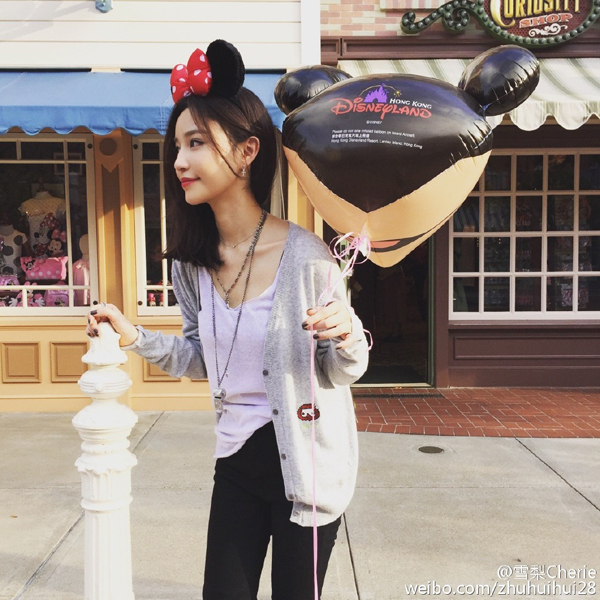China's 'Internet celebrity economy'
- By Zhang Lulu
 0 Comment(s)
0 Comment(s) Print
Print E-mail China.org.cn, September 9, 2015
E-mail China.org.cn, September 9, 2015
|
Zhu Chenhui, allegedly the newest girlfriend of China's "No.1 eligible bachelor" Wang Sicong, son of one of China's richest men Wang Jianlin. Recent media reports have estimated that she will make around 150 million yuan this year, or roughly US$23.57 million. [Photo/Sina Weibo] |
Zhu Chenhui, allegedly the newest girlfriend of China's "No.1 eligible bachelor" Wang Sicong, son of one of China's richest men Wang Jianlin, recently made a splash online, not because of any further gossip between the two, but because of media reports claiming that she would make around 150 million yuan, roughly US$23.57 million, this year. That is more than Fan Bingbing, China's richest celebrity who earns around 128 million yuan a year.
Zhu represents a group called "Wang Hong," or Internet celebrities, some of whom used to be derisively described as having the similar features of a tiny face, sharp chin, extraordinarily big eyes and often suggested to have had cosmetic surgery in South Korea. However, many of them have already turned their good looks and online fame into money.
At 3 p.m. on July 27, a total of more than 5,000 clothing items sold out in two seconds from an online store run by Zhang Dayi. A former model who frequented fashion magazines, Zhang is now the owner of an online shop that is set up on Taobao, China's largest online retailing platform run by Alibaba's Jack Ma. All of the new products sold out in three days, which is equivalent to the sales volume of a brick-and-mortar shop over a one year period.
The shop owner Zhang has more than 3 million fans on China's Sina Weibo, a Twitter-like online platform, more than the fan base of many major stars. The shop opened in May, 2014 and whenever new clothes come in, the shop ranks No.1 in women's clothes on Taobao that day.
"Since the latter half of last year, we have noticed some of the women's clothing shops on Taobao are quite different from others. Those shops have turned into blogs, the clothes are independently designed and money is made this way." said Jin Ke, director of Taoboa's clothing division.
Unlike some of their counterparts in Western countries, who often make money by featuring in branded products on Instagram or other social media platforms, many Chinese Internet celebrities have developed their own brands, often clothes or cosmetics, and run their own online shops while promoting the products through Sina Weibo or WeChat, an instant messaging app similar to WhatsApp.
Data from Taobao shows that there are over 1,000 shops run by Internet celebrities. During the "Double 11" day, or November 11th when shops on Taobao offer big discounts, 7 out of the top 10 women's clothing stores are those owned by Internet celebrities. Many of the celebrity's shops can rake in more than 10 million yuan every time they launch new products.
"They have a huge fan base on social media, and they can turn their popularity into productivity." said Tang Song, the marketing director of Taobao's clothing division. According to Tang, traditional shops often follow the routine of first launching a small number of products and then determining whether to promote them or not depending on initial market response, but those web celebrities only have to post photos of their new clothes on social media and then decide how many to produce based on the online comments. This drastically reduces costs in the supply chain. "An Internet celebrity with 500,000 followers can easily make around 40,000 yuan." he added.







Go to Forum >>0 Comment(s)